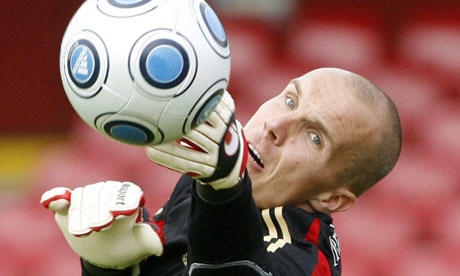
It would be easy to indict the judges of this year's William Hill prize – sportswriting's Booker – for opportunist cynicism in selecting Ronald Reng's A Life Too Short: The Tragedy of Robert Enke (Yellow Jersey £16.99) as this year's winner. Easy, but wrong. While Reng's victory with his compassionate, moving life of the German goalkeeper who killed himself in 2009 was announced the day after Wales manager Gary Speed's baffling suicide, the decision had been made earlier. And the judges got it right. In recounting Enke's personal calvary, Reng, already known in Britain for his Keeper of Dreams, also offers sharply humane insights into the singularity of goalkeepers and the predatory madness of big-time football.
At least one critic saw this year's shortlist as merging sports books with "misery lit". But while Paul Kimmage's ingeniously scripted Engage: The Fall and Rise of Matt Hampson (Simon & Schuster £16.99) vividly conveys the rage, fear and distress of a young rugby player paralysed for life by a collapsing scrum, its depiction of an irrepressible spirit is too uplifting to qualify. Another ill-fated rugby man, Alastair Hignell, confronts multiple sclerosis with similarly clear-eyed honesty in Higgy: Matches, Microphones and MS (Bloomsbury £18.99), an account of his playing and broadcasting career as thoughtful and likable as the man himself.
Also a fine cricketer, Hignell was a rare modern two-sport star. A great two-sport predecessor, both Olympic sprint relay medallist and winning try-scorer last time Wales beat the All Blacks, is Ken Jones, who gets the biography he has long deserved in Steve Lewis's Ken Jones: Boots & Spikes (Sportsbooks £18.99). Specialised professionalism makes such feats almost inconceivable nowadays. Anyone nostalgic for days long gone should read Bill Jones's William Hill-shortlisted The Ghost Runner (Mainstream £12.99), a grimly compelling account of 1950s athlete John Tarrant's battle against officials who wielded the ideal of amateurism as a means of excluding outsiders.
Class conflict also infuses Guy Fraser-Sampson's Cricket at the Crossroads (Elliott & Thompson £18.99), an uneven account of the game between 1967 and 1977 which is excellent on the demise of Brian Close as England captain and the betrayal by officialdom of Basil D'Oliveira. Another South African expat, Tony Greig, like Close an England captain, is one of Fraser-Sampson's key characters. He gets full-length treatment in David Tossell's Tony Greig (Pitch Publishing £14.99), which argues convincingly that Greig's origins, and involvement in the World Series Cricket revolution, led to his receiving less than his historic due as a player.
Despite having bowled England to a historic win with off-breaks Greig is barely mentioned in Amol Rajan's Twirlymen (Yellow Jersey £16.99), an engagingly quirky, opinionated and discursive history of spin bowling. Rajan's subjects include current England spinner Graeme Swann, whose The Breaks Are Off (Hodder & Stoughton £20) won column inches for its criticism of Kevin Pietersen's short-lived England captaincy but is essentially a cheerful amble through a late-blossoming career.
Good cheer is sadly absent from Tony Francis's Who Was Hurricane Higgins? (Hodder & Stoughton £20), which definitively demonstrates that the Belfast snooker genius was his own worst enemy while explaining why there were numerous rivals for that role. Harrowing though it is, Francis's book is never as chilling as the passage in Michael Cannell's story of 1950s motor racing The Limit (Atlantic Books £17.99) that describes how Formula One champion Alberto Ascari deliberately distanced himself from his young children so they would not feel the loss so deeply when, inevitably, he was killed.
The attachment of Ascari's compatriots to a different form of racing is superbly chronicled in John Foot's Pedalare! Pedalare!: A History of Italian Cycling (Bloomsbury £14.99), a worthy companion to his earlier volume on Italian football, while cycling fans with more contemporary tastes were well served by David Millar's William Hill-shortlisted autobiography, Racing Through the Dark (Orion £18.99). For football fans seeking a good autobiography, Ricardo Villa's And Still Ricky Villa (Vision Sports £18.99) deserves a far wider readership than the target audience of Spurs fans for its evocations of Argentinian life and football and immigrant experience in 1970s Britain.
Fan experience was a rich field this year. John Crace's Vertigo (Constable £12.99) brought a sharp, self-knowing eye to the twin afflictions of depression and supporting Spurs. The William Hill judges shortlisted both Dave Roberts's 32 Programmes (Bantam £12.99), a wistful evocation of the author's early life told through a vast accumulation of football programmes he was forced to cull, and Pat Collins's Among the Fans (Wisden £18.99), acute, vivid and usually generously observed essays by a distinguished journalist who forsook the press box for the paid seats.
And those planning Olympic spectatorship in 2012 will not find a better vade mecum than How to Watch the Olympics (Profile £10.99), David Goldblatt and Johnny Acton's crisply informative guide to all 29 sports in next summer's games.
Huw Richards is the author of A Game for Hooligans: The History of Rugby Union (Mainstream)

